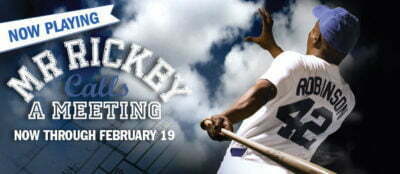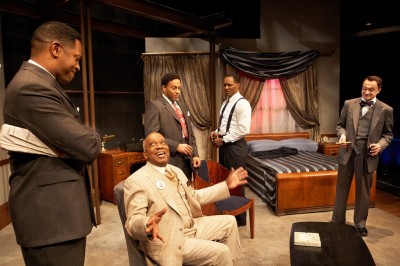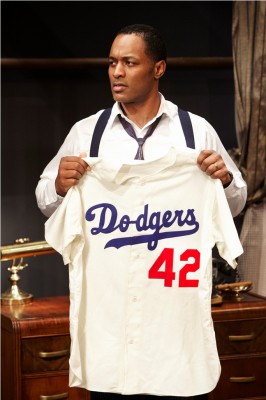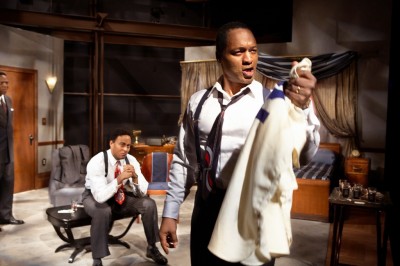Mr. Rickey Calls A Meeting
Directed by J. Nicole Brooks
At Lookingglass Theatre, Chicago
Historical fictional drama sheds light on varied views of integration
On the eve of Branch Rickey’s bold move to integrate Major League Baseball in April of 1947, playwright Ed Schmidt supposes that Rickey called a secret meeting of three black public legends in order to gain their support as Jackie Robinson (Javon Johnson) was to be given the opportunity to play baseball for the Brooklyn Dodgers as the first black player since 1880.
Mr. Rickey (Larry Neumann, Jr.), the white general manager of the Dodgers, wants to show a united front to his integration initiative of baseball with champion boxer Joe Louis (Anthony Fleming III), legendary dancer Bill “Bojangles” Robinson (Ernest Perry, Jr.), and singer/actor and political activist Paul Robeson (James Vincent Meredith). The three meet in a NYC hotel room with a waiting press conference in the works in the lobby. Rickey’s strategy snags when Paul Robeson voices concerns about the ‘big picture’ of putting a black man on a Major League baseball team.
After several scenes where we meet and see the foibles of each black legend – Louis’ drinking and diminished athleticism, Robinson’s gambling and ambivalence toward controversy, and Robeson’s idealistic objections and his abrasive radicalism. Rickey assumes an easy show of unity but as events unfold and are witnessed and semi-narrated by the 17 year-old bellhop Clancy Hope (Kevin Douglas), a frank and heated discussion of the long term effects of a white man integrating baseball in stead of black men forcing open the American Pastime ensues.
Robeson pontificates, chides and argues with Rickey, Robinson, Bojangles and Louis that they must consider what is endured by those who break barriers and at what cost? Robeson envisions that progress has its price and that things get lost along the way. The Negro League will quickly disappear, Bojangles as a part owner will lose money and Jackie Robinson will endure severe racial harassment. Others argue that Robinson’s elevation to the Big Leagues will lead the way for others and eventual complete integration of society. The nature and degree of compromise is vividly presented.
Playwright Ed Schmidt presents most sides of the arguments as well as presenting the mixed motivations of Branch Rickey. Larry Nueman, Jr. is most effective as the charismatic baseball trailblazer. Is Rickey sincere or a self-interested manipulator? Is Robeson grandstanding or is he just being a pontificating radical? James Vincent Meredith is commanding as the idealistic singer. Anthony Felming III captures the subdued angst of the fading boxing champ , Joe Louis. Ernst Perry, Jr. presents the survival manner of Bojangles and Kevin Douglas demonstrates the hero worship and hope of young black folks as the bellhop.
Mr. Rickey Calls A Meeting is a fine historical fictional drama based on real characters put into a “what if” scenario. The show is humorous, thought provoking and truthful as it attempts to ask underlying questions as to the ramifications of a single ensuing historical event. The performances are strong and winning. The play highlights the multilevel consequences of Jackie Robinson and Branch Rickey’s bold move. In many ways, integrating Major League Baseball paved the way the Civil Rights Movement. Schmidt’s 80 minute one-act poses questions about race relations that are still alive today. This is a terrific play-don’t miss it!
Highly Recommended
Tom Williams
Talk Theatre in Chicago podcast
Date Reviewed: January 14, 2012
For more info see the Mr. Rickey Calls A Meeting page on theatreinchicago.com
At Lookingglass Theatre, 821 N. MichiganAve., Chicago, IL, Call 312-337-0665, www.lookingglasstheatre.org, tickets $27.50 -$68, Wednesdays through Sundays at 7:30 pm, matinees at 3 pm on Thursdays, Saturdays and Sundays, running time is 80 minutes without intermission, through February 19, 2012
Another Review of Mr. Rickey Calls A Meeting by Clint May
The real-life legendary first meeting of white Brooklyn Dodgers general manager Branch Rickey and Montreal Minor Leaguer Jackie Robinson lasted several grueling hours. Rickey wanted to test Robinson’s mettle by slurring him with racial epithets to ensure he had the strength to turn the other cheek as often as need be. He knew Robinson wasn’t just going to break baseball’s unwritten rule of discrimination—he had to become a paragon of virtue and agree to set the example for all others who would follow in his footsteps. Jackie wasn’t necessarily the best player, but he was to Rickey’s eyes the best man for the job.
The fictional 1947 meeting at the heart of author Ed Schmidt’s Lookingglass production, had it taken place, may have looked a lot like it does under director J Nicole Brooks authentic eye. In a brisk 90 minutes, the production sketches then deepens the racial issues of 1940’s America.
The impetus for the meeting is an embarrassing public scandal that demonstrates to Rickey (Larry Neumann Jr) the political delicacy of his game-changing decision to break the color barrier, nearly four years after deciding to do so. He comes to the conclusion he can’t move forward without the combined endorsements of representative voices in the African-American community. Priming Robinson (Javon Johnson) like a political candidate in a secret rendezvous at The Hotel Roosevelt, Rickey’s intentions are both noble and pragmatic.
Inspired by a mostly discredited biography of Robinson, the titular meeting brings three African-American representatives to the table to discuss the thorny issue of Robinson’s call-up to the Major Leagues. From the world of singing, Paul Robeson (James Vincent Meredith); from movies and stage, Bill “Bojangles” Robinson (Ernest Perry); and from boxing, Joe “The Brown Bomber” Louis (Anthony Flemming III). Each participant is a facet in a complex and nuanced topic and each has a philosophical and historical point to make. From diplomatic to bombastic, each one takes a turn at “bat.” Robinson is just starting on his own journey into history, and hearing the quartet voice their opinions gives him a voice he may not have known he had.
The issue at hand isn’t just Robinson’s upward mobility, but who is opening the door and who is walking through it. One by one each person is made aware of the ripple effects, with Robeson (a real-life civil rights activist) becoming Rickey’s nemesis as he attempts to sway the argument in favor of a more drastic public statement to Rickey’s more patient ploy.
With the discussion in Hollywood turning to George Lucas’ all-African-American cast of Red Tails, it’s amazing to think that even in our increasingly post-racial society, a blockbuster movie is being promoted as breaking the action-movie color barrier (who among us knew it even existed?). Arguments like the one in Mr. Rickey must be taking place still today. Right or wrong as it may be to place the onus of success or failure upon one representative, an individual still has the ability to stand for a much larger sentiment. That makes Mr. Rickey all the more important for everyone on any side of the argument as Hollywood makes clear we aren’t out of the woods.
Lookingglass’ reliably detailed and lavish staging combined with stellar performances bring this period piece into the present without feeling forced. The only problem, if it can be called that, is bellhop Clancy Hope (Kevin Douglas). His anachronistic sycophancy, while perhaps period-appropriate, seems to have drifted over from another production and brings unnecessary comic relief to the tone of the production. It’s a minor quibble in the light of so many excellent performances. Neumann is sublime as the self-aware Rickey, trying desperately to achieve his goals both for his personal profit and his more altruistic motives. Johnson’s Robinson is both devoted and conflicted to the man who made him and the burden he knows he’ll bear. Fleming plays Louis as a smoldering volcano who surprises everyone with his convictions. As firebrand activist Robeson, Meredith skirts stereotypes but manages to create a complex and sympathetic man in the midst of an ongoing revolution.
Knowledge of baseball is not a prerequisite for viewing—you only have to have lived in America to appreciate this exploration of complex issues that still pulse under our veneer of political correctness, and it’s refreshing to see a no-holds-barred production stand up and pull it back to remind us that the fight isn’t over yet.
Highly Recommended.
Clint May
Date Reviewed: January 14, 2012




